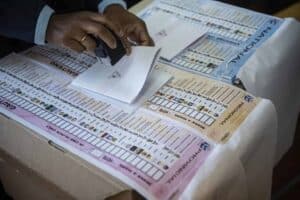The Independent Electoral Commission is consulting various role players following retired justice Dikgang Moseneke’s release of a report on how the next local government elections can be free and fair.

Experts have placed heavy emphasis on the pace of the Covid-19 vaccine roll-out in South Africa in ensuring free and fair elections are achieved this year.
The immunisation drive has been marred by various obstacles this year, from procurement delays to contamination and most recently, the devastating effects of violent protests and looting following the detention of former president Jacob Zuma.

LIVE interactive map, latest news, multimedia and more!
View MapALSO READ: Moseneke report: Elections unlikely to be free and fair if held this year
The Independent Electoral Commission is consulting various role-players following retired justice Dikgang Moseneke’s release of a report on how the next local government elections can be free and fair in the context of the Covid-19 pandemic.
The Commission is expected to meet with a political affiliation committee on Thursday, comprising of parties represented in national, provincial and local governments.
According to Professor Kate Alexander, researcher at the University of Johannesburg (UJ) Centre for Social Change, said she expects that political parties would be more likely to favour a postponement.
“Any postponement of voting should have popular support. It is clear from the UJ/HSRC Covid Democracy survey that a large majority of the population prioritise their health, and want a delay.
“We won’t have achieved population immunity by February next year and it is not definite we will be over the 4th wave this year. The Electoral Commission would be wise to seek greater flexibility over the timing of the election,” she says.
“From what we know about the rollout, the last people to be vaccinated will tend to be those who are younger or poorer, and it would be unfair to have elections that discriminate against them.”
ALSO READ: Business leaders commit to rebuilding SA economy
In his report, Moseneke recommended that the elections be postponed from the preliminary October 2021 date to February 2022.
This would mean that a new date would have to be set for no later than the end of that month. The Constitution requires that local government elections take place every five years and 90-days.
Moseneke’s report considered the views of scientists and scientific evidence relating to the risks of the current wave of Covid-19 infections in the country, and the projected trajectory of a predicted fourth wave.
The report highlights the risks that mass gatherings potentially have in reversing the government’s efforts to contain the spread of the virus, but also points out the constraints that parties have under the current restrictions in terms of campaigning for their election.
Rallies and door-to-door campaigns are flagged as clear risks for spreading the pandemic, and would not be permitted under the current lockdown regulations.
According to the University of Cape Town’s Centre for Analytics and Behavioural Change (CABC), the looting and disruptions which took place in Gauteng and KwaZulu-Natal severely impacted the Covid-19 vaccination rate across the country.
A social listening report by the CABC found that mistrust in government and exposure to disinformation is hampering the vaccination programme, despite the overwhelming enthusiasm by people over 35 to get vaccinated.
The extension of lockdown level 4, and the shutdown of several vaccination sites in the two provinces affected by widespread looting, is also raised concerns among citizens, according to the report.
ALSO READ: Vaccine hesitancy: Is avoiding the jab a gamble you should take?
The South African Council of Churches (SACC) has also emphasised the importance of a faster pace of vaccination, as risks of more outbreaks abound with every delay in the roll-out.
Bishop Malusi Mpumlwana, General Secretary of the SACC, says he notes with interest the balancing act proposed in the Moseneke Report.
“It is holding a balance of hope between the fear of further variants and the pace of vaccination. It is indeed a balance of hope – and that’s all it can be. Indeed, population-wide immunity will create the environment for free and fair elections, and obviate the impact of future variants.
“Can this be done fast enough even for end of February? To achieve that, the SACC believes that all of us must do all we can, to ensure that the people closest to us – family, neighbours, fellow workers or fellow congregants, all register and vaccinate. This will create the space for free and fair elections by and for a safe and healthy South Africa.”
The SACC has been assisting government with the vaccine registration drive by assisting vulnerable
communities.
Constitutional Amendment
Moseneke’s recommendations would require an amendment to the Constitution, which would be disobeyed if elections don’t go ahead this October.
According to Terry Tselane, chairman of the Institute for Electoral Management Services in Africa (IEMSA), there are two legal options available for the elections to be postponed.
The first method, he told journalists, is via a majority vote by public representatives where 75% of national assembly members would have to vote for the Constitutional amendment, as well as the majorities of six provinces.
Another option would be for the Electoral Commission of South Africa (IEC) and cabinet to approach the Constitutional Court to have the amendment approved by an order.
Opposition parties provided mixed reactions to Moseneke’s recommendation, with Cope expressing respect for the decision, while the Democratic Alliance (DA) is against a possible postponement.
While Cope spokesperson Dennis Bloem cited the alarmingly high number of infections and deaths in the third wave of infections as a good reason to postpone, the DA’s Siviwe Gwarube contended this did not justify a postponement.
Mass gatherings, she argues, are not necessary for free and fair elections to go ahead.
“It is these events that give rise to the risk of Covid transmission – not the holding of elections in themselves,” she says.






